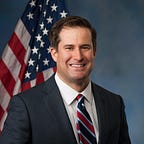Vote Explanation for S. 84 — To provide for an exception to a limitation against appointment of persons as Secretary of Defense within seven years of relief from active duty as a regular commissioned officer of the Armed Forces
I voted for S. 84, which provides a specific exemption for appointment of persons as Secretary of Defense within seven years of departing active duty as a regular commissioned officer of the U.S. Armed Forces. This legislative exemption was designed in response to the nomination of General James Mattis to be the next Secretary of Defense.
This exemption is necessary because, as established by law in the 1947 National Security Act of the United States and later amended in 2008, there is a prohibition on any retired military officer from serving as Secretary of Defense for seven years after leaving active duty. This law is designed to enshrine and protect our Constitutional principle of civilian control of the military. In 1950, Congress made a one-time exception to the rule to allow Gen. George C. Marshall to serve as Defense Secretary. This was considered an extraordinary situation because the United States was facing potential defeat in the Korean War.
I have great respect for Gen. Mattis and believe he is well-suited to lead our nation’s military. Gen. Mattis has led one of the most significant commands of our nation (Central Command, overseeing the wars in Iraq and Afghanistan). He is a deep thinker, a student of history, and has repeatedly stood up for our American values under great pressure. This is precisely the kind of thoughtfulness and perspective we need — especially when the incoming administration has shown, time and again, a rampant disregard for our national security and that of our allies, as well as the lives of those serving on our front lines.
Nonetheless, I committed to fully reviewing and examining the impacts of granting this legislative exemption — as did both the Republican Chairman and Democratic Ranking Member of the House Armed Services Committee. I was eager to hear the Chairman’s assurances that Gen. Mattis would appear before our committee to answer important questions about his vision for the Department of Defense and his views on civilian control of our military. When I learned the incoming administration decided to block Gen. Mattis from appearing, I was disappointed that we would not be afforded the opportunity to duly examine and question Gen. Mattis on this significant — and rare — change to the law. I therefore decided to vote against the exemption in committee.
At the end of the day, however, the bigger issue at hand remains Gen. Mattis’ suitability for the position and the high-caliber and intellectual rigor he brings to the job, as well as his willingness to stand up to an administration that has already demonstrated a dangerous lack of knowledge, morality, and competence when it comes to our national defense. Despite the flawed process leading up to this vote, I ultimately decided it to be in our nation’s interest to vote in favor of the exemption, thereby providing the legal groundwork for Gen. Mattis to serve as Secretary of Defense, if so confirmed by the Senate.
